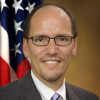Officials
Offical

On March 18, 2013, President Barack Obama nominated Thomas E. Perez to be the Secretary of Labor, succeeding Hilda Solis, who was secretary starting in 2009. Perez has served in the Department of Justice as assistant attorney general for Civil Rights, the nation’s top civil rights enforcer, since 2009. Senate Republicans have already indicated that they may filibuster Perez, just as they recently did Obama's nominations of John Brennan to CIA and Chuck Hagel to the Defense Department.
Born in Buffalo, New York, on October 7, 1961, Thomas Edward Perez was the youngest of four children born to Rafael and Grace (née Brache) Perez, who had emigrated from the Dominican Republic. Rafael, a physician who earned U.S. citizenship by joining the U.S. Army during World War II, practiced medicine at a VA hospital and died when Thomas was 12 years old. His maternal grandfather, Rafael Brache, was the Dominican ambassador to the U.S. until his own government declared him persona non grata for criticizing the regime of President Rafael Trujillo, a notorious dictator.
After graduating from Buffalo's Canisius High School in 1979, Perez earned an A.B. in International Relations and Political Science from Brown University in 1983, a J.D. from Harvard Law School in 1987, and a Master’s in Public Policy from Harvard’s John F. Kennedy School of Government in 1987. At Brown, he worked at the University's dining hall, and at Harvard, he was a law clerk for Attorney General Edwin Meese in 1986. After law school, Perez was a law clerk from 1987 to 1989 for Judge Zita L. Weinshienk in Colorado.
Following his two-year clerkship term, Perez went to work at the Justice Department’s Civil Rights Division in Washington, DC. From 1989 to 1995, he prosecuted federal criminal civil rights cases involving police misconduct and hate crimes. He was an instructor at the Attorney General’s Advocacy Institute, and also provided training to law enforcement officers, in the United States and abroad, on how to prevent police misconduct. He was heavily involved in Department efforts to combat racial profiling, including the successful prosecution of a high profile hate crimes case in Lubbock, Texas, where the defendants went on a fatal, racial-motivated crime spree directed at African-Americans.
Leaving the Justice Department in 1995, Perez was special counsel to Senator Edward M. Kennedy (D-Massachusetts) from 1995 to 1998, serving as his principal adviser on civil rights, criminal justice, and several constitutional issues. Perez was involved in the successful passage of the Church Arson Prevention Act in 1996, and in the development of the Hate Crimes Prevention Act.
Returning to the Justice Department, Perez served as deputy assistant attorney general for Civil Rights from January 1998 to February 1999, where he assisted in policy development and oversight of the litigation at the Civil Rights Division. He played a major role in the establishment of the Worker Exploitation Task Force, an interagency working group designed to combat the unconscionable exploitation of vulnerable immigrants, often in conditions amounting to slavery.
From February 1999 until the conclusion of the Clinton administration in early 2001, Perez served as director of the Office for Civil Rights (OCR) at the Department of Health and Human Services, where he oversaw the enforcement of anti-discrimination laws in the health and human services setting and was Secretary Donna Shalala’s principal adviser on civil rights issues. During Perez’s tenure, OCR played a major role in the Department’s efforts to eliminate racial and ethnic disparities in health, the subject of an article Perez subsequently published, in which he argued that ethnic and racial discrimination played a major role in undermining the health of minority groups.
A Democrat in a politically appointed position, Perez found himself out of work after the election of President George W. Bush. In April 2001, he was appointed assistant professor and director of Clinical Law Programs at the University of Maryland Law School, where he taught clinical law courses and oversaw the Law School’s clinical law programs until 2006.
A resident of Takoma Park, Maryland, Perez was elected to the Montgomery County Council in 2002, serving as council president in 2004 and 2005. In 2006, he ran for the Democratic nomination to be Maryland Attorney General, but his bid was eventually rejected by the Maryland Court of Appeals, which ruled that he had not practiced law in the state for long enough to qualify for the post. In January 2007, he entered Maryland state government, when he was appointed acting secretary of Labor, Licensing, and Regulation, a position that became permanent in March 2007, and which he held until his appointment to the Justice Department in 2009.
Among the private organizations in which Perez has been involved are the Latino-based service and advocacy organization Casa de Maryland, on whose board of directors he sat from 1995 to 2002, and the Sullivan Commission on Diversity in the Health Professions, a bipartisan group addressing the lack of minority representation in the health professions. In late 2008, Perez was appointed a member of the Agency Review Team of the Obama-Biden Transition.
Perez donated $1,250 to Democratic candidates and causes between 2004 and 2008.
Perez and his wife, Anne-Marie Staudenmaier, an attorney with the Washington Legal Clinic for the Homeless, have three children.
To Learn More:
Perez has the Track Record to Lead Labor Department (by William G. Robertson and Ronald R. Peterson, The Hill)
Obama's Labor Nominee Faces GOP Opposition Over His Role In A Supreme Court Case (by Carrie Johnson, NPR)
Thomas E. Perez: Prevailing Wage Lifts Workers, Sets Example for Employers (by Thomas E. Perez)
- Latest News
- D.C. Public Schools will Teach all Second-Graders to Ride a Bike
- New Rule in Germany Limits Sales of Sex-Themed E-Books to 10pm to 6am
- What Happened to the 6-Year-Old Tibetan Boy the Chinese Government Kidnapped 20 Years Ago?
- U.S. Ambassador to Turkey Photoshops his Hair Color to Mock Turkish Mayor
- Mystery Artist Calls Attention to Unfixed Potholes by Drawing Penises around Them





